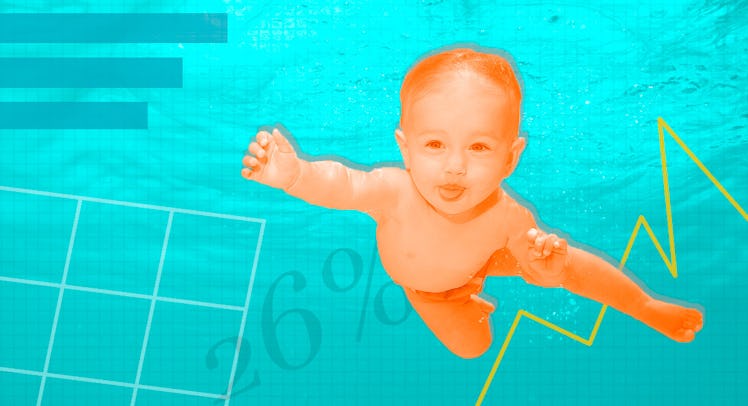When It’s Safe To Throw Your Baby Into A Pool
Pediatricians are not convinced that this drowning precaution does more good than harm.

Parents are now submerging babies as young as 6-months-old in water, in order to tap into infants’ purported ‘swimming and floating reflexes’. And, while it’s true that most babies can reflexively hold their breath and even float, this does not mean that this is a safe or advisable to put those reflexes to the test.
“I don’t think this method to teach babies to swim is safe or advisable. Although it seems to work for some children, there is a significant risk water getting into the lungs if a baby doesn’t hold his or her breath for long enough, or at the right time,” Dr. Andrew J. Bernstein, a pediatrician and fellow of the American Academy of Pediatrics, told Fatherly. “This can lead to a lack of oxygen to the brain, pneumonia, or death.”
Parents seem largely unconcerned. A video search for “throwing babies in pools” yields over 170,000 results, and high profile people like the Princess of Monaco have endorsed the practice. Given that drowning is a leading cause of death for children under age four, according to the Centers for Disease Control and Prevention, it’s not entirely shocking that parents are hoping to drown-proof their children. But that enthusiasm is a double-edged sword—it relies on an anti-drowning reflex that doesn’t always kick in.
“This reflex not reliable enough, in my opinion, to safely rely upon,” Bernstein says.
In the past, the AAP has cautioned against even offering swimming lessons before the age of four, much less throwing six-month-olds into the deep end. But the organization recently revised its recommendations in light of research indicating that swimming lessons may prevent drownings even in one-year-olds. But there is still no evidence that testing infants’ breathing reflexes in such an extreme way does anything but subject them to unnecessary risk.
“Parents should not try this at home,” Bernstein says. “I’m not aware of any actual, reputable licensing body that could certify someone as a professional, trained in tossing kids in water and hoping they don’t drown.”
This article was originally published on